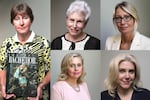
For our series on Oregon's Soviet Diaspora, Think Out Loud talked to five Eastern Europeans in the Portland area.
Scott Greenstone, Sage Van Wing / OPB
Tatyana Sundvall was only 14 when she realized she had to leave Russia.
Sundvall saw a program on TV about American prisons, and she realized that American prisoners lived better than Russian citizens.
"They had TV in their rooms, VHS players," Sundvall said. "They had hot water and running water."
Five years later, she was in Oregon.

The biggest wave of post-Soviet refugees came in the mid-'90s, but they've been trickling in ever since.
Courtesy of the Coalition for Communities of Color and Portland State University.
Sundvall is one of hundreds of thousands who left the former Soviet Union and came to America. So many of those immigrants came to Oregon that today Russian is the third most spoken language in the state, according to the American Community Survey.
But the Russian-speaking community remains largely invisible.
In conversations with OPB's Think Out Loud, members of the Portland-area community from the former Soviet Union estimated their number at around 100,000; however, according to a 2014 report from the Coalition for Communities of Color and Portland State University, members of this community often don't respond to surveys or don't trust the surveyors.
That's because a lot of them worked in construction or real estate, areas hit especially hard by the downturn, according to Karina Rutova, a member of the City of Portland's Slavic Empowerment Team.
"They lost their jobs; they were not able to pay for houses," said Rutova. "Their income wasn't too high, but they got big houses and then they lost them."

A poster made by staff in Vancouver Public Schools to help ESL children feel comfortable saying the American pledge of allegiance. In Russian, staff replaced 'pledge' with 'promise,' because Christian Ukrainians don't believe in pledging allegiance to anyone except God.
Scott Greenstone / OPB
That same report showed that the Slavic community struggles in the American education system; that one in five have no health insurance; and that the community was hit especially hard by the recession, with the average family losing a quarter of its income between 2008 and 2011. At the same time, though immigration from the former Soviet Union has slowed down to a trickle since the '90s, the fertility rate is triple that of the mainstream white community.
It's been almost 25 years since the Soviet Union dissolved, so Think Out Loud asked the immigrant community about their lives in America. Here are five perspectives from five immigrant women:
Karina Rutova

Karina Rutova, a Jewish Ukrainian, who helped start the Slavic Empowerment Team in Portland.
Scott Greenstone / OPB
When they first arrived, everything was different for Soviet refugees — from riding the bus to reading signs to how you buy food, said Karina Rutova, assistant director at the Gateway Center for Domestic Violence Services.
“Whenever you arrive to a new country, it's really difficult the first few months, few years. … There's a cultural shock, always.”
Rutova has Jewish ancestry, so she came to the U.S. to escape discrimination. That's the overwhelming reason people in the Soviet world came to Oregon, though most of them are evangelicals, Pentecostals and Baptists.
Natasha Haunsperger
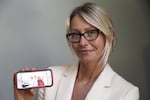
Natasha Haunsperger, a Portland police officer from former Yugoslavia, with a photo of her parents in Rovinj on the coast of Croatia. Haunsperger went to this harbor in Rovinj as a girl.
Scott Greenstone / OPB
A large percentage of Eastern Europeans live on the east side of Portland — Happy Valley, Clackamas County, Beaverton and Vancouver — and in the Woodburn and Canby area, says Portland Police Officer Natasha Haunsperger. Haunsperger is from former Yugoslavia, but she learned Russian here to better connect with the Slavic community.
“To with a single brush-stroke paint very complex and diverse and different communities from that part of the world would be very difficult. Therefore, what unifies them here is that passage of being an immigrant, regardless of whichever republic or ethnic group or religious background they come from.”
Four years ago, Haunsperger saw a surge of burglaries in the Slavic community. When she investigated, she found that this had been happening for a while and no immigrant families trusted the police enough to say anything.
"We just did not feel comfortable, we were afraid, we did not believe in you," people told Haunsperger.
She realized that the police had to reach out first.
Yelena Benikov
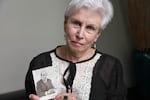
Yelena Benikov, a Ukrainian Jew, with a photo of her brother Aleksandr Vertman, who still lives in Ukraine.
Scott Greenstone / OPB
When immigrant families came to America, their level of education was low: The majority had only middle school or less. So "the dream," according to retired family liaison Yelena Benikov, was for boys to grow up and be truck drivers or construction workers, and for girls to be married at 15, 16 or 17.
Benikov worked at Vancouver Public Schools from the 1990s until 2015 and saw an entire generation of Eastern European children come in, learn English, try to fit in and decide what to do with their lives.
Sometimes that was different from what their parents — and especially grandparents — wanted for them.
“Step by step, kids were our biggest helpers. They asked parents — they said, 'I want to be like all other kids. I don't want to be different.”
Olga Parker
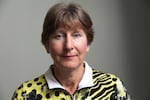
Olga Parker, a counselor for Russian families, said she didn't really learn how to smile until she came to America.
Scott Greenstone / OPB
The Soviet mindset was often one of distrust, according to Olga Parker, a family counselor with Lutheran Community Services Northwest. She's overcome the Soviet prejudice against counseling and worked with Soviet families learning to trust Americans — and each other.
"We all had been living behind the Iron Curtain," Parker said. "We all had been experiencing certain pressure and couldn't trust each other, even."
“I had some pain in my muscles in order to smile, because I was learning how to smile.”
Tatyana Sundvall
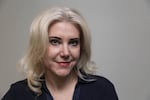
Tatyana Sundvall came to America as a mail order bride, desperate to escape society in Russia.
Sage Van Wing / OPB
Tatyana Sundvall was born in a town five minutes from the border of Ukraine. At 19, Sundvall saw an ad in a magazine calling for "beautiful Russian women." Fed up with Russian men, she borrowed $200 from the mob, headed to Moscow and met a man from Winston, Oregon. The two got engaged that week.
Six months later, she arrived in Seattle.
"The first thing I remember was the smell of coffee — how wonderful it was and how fresh it was and how unbelievably the entire airport smelled of coffee," Sundvall said.
She lived in an isolated "forest house" in Winston, miles away from anyone else, where she would cook and clean and try to learn English from the television. Life, at first, was hard: She couldn't speak to anyone, she divorced her husband after a year and a half. Staying in the country was a hard thing to manage.
“I felt full of love, and nobody wanted it in Russia.”
But today, Sundvall works in real estate, has remarried and helps support her family back home. Last year, she became an American citizen.
"I love this country," Sundvall said. "I never would have been able to build this kind of life for myself in Russia."